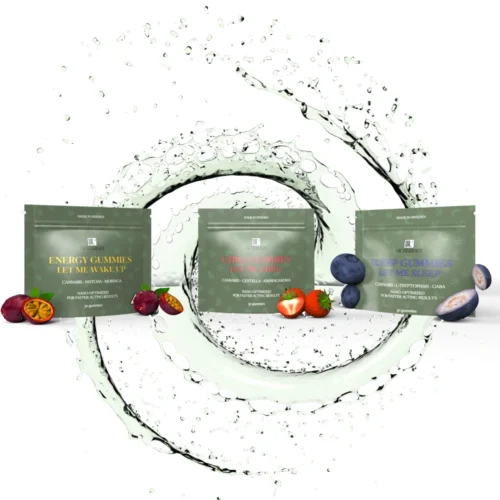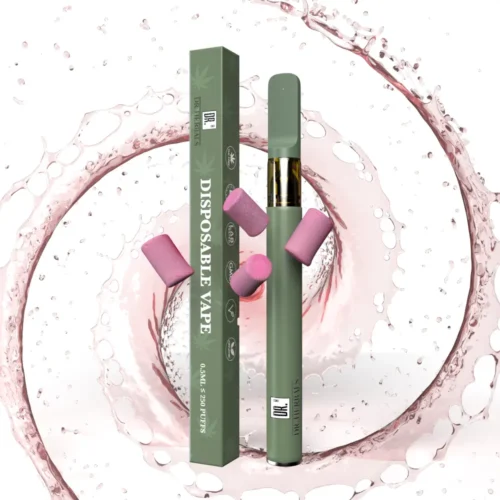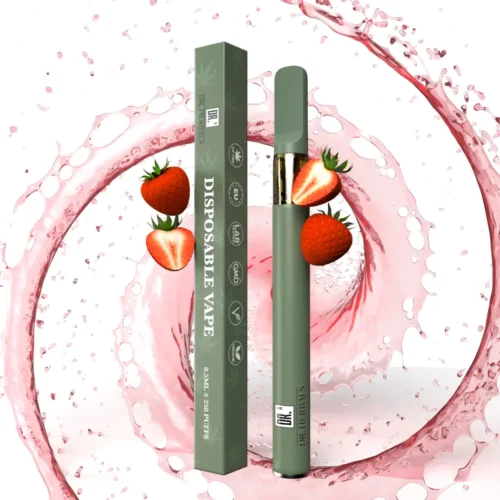What is THCP and its effects?
Discover THCP: A legal & natural cannbinoid found in hemp that has gained increased attention due to its potential to be stronger than THC.
What is the THCP?
THCP is a legal & natural cannabinoid similar to THC.
Tetrahydrocannabiphorol (THCP) is one of about 120 natural compounds belonging to the cannabinoid family and has recently gained attention for its potential role in cannabinoid research. THCP shares structural similarities with delta-9-tetrahydrocannabinol (THC), the active compound in cannabis, but is distinguished by a longer alkylene chain, suggesting increased binding affinity to cannabinoid receptors.
Research on THCP focuses on its potential pharmacological properties and impact on the endocannabinoid system. Preliminary studies suggest that THCP may have a stronger binding affinity to cannabinoid receptors than traditionally known cannabinoids, opening up opportunities in drug development and therapeutic use. However, more research is needed to understand its full range of effects and possible medical uses.
Is THCP legal in Sweden?
THCP is a natural cannabinoid that was recently regulated in Sweden and is currently classified as a narcotic, in parallel with THC.
The Public Health Agency of Sweden has identified THCP as a potentially dangerous substance.
Does the THCP show a drug test result?
If THCPs are used frequently, there may be some risk that they may give a positive result in drug tests, such as rapid urine or saliva tests.
We therefore recommend that in case of any tests by the police or your employer, you request a blood test. A blood test provides a more detailed reading of cannabinoid levels and thus allows the exclusion of the use of illegal cannabis products such as THC or HHC.
What is the difference between THCP, THC and CBD?
THCP differs from other cannabinoids such as THC (tetrahydrocannabinol) and CBD (cannabidiol) in several ways, including its chemical structure, affinity for cannabinoid receptors and potential biological effects. Here are some of the key differences:
Chemical structure:
- THCPTHCP is a type of tetrahydrocannabinol and shares the basic chemical structure with other THC variants. What distinguishes THCP is the longer aliphatic side chain, which gives it its name.
- THC: is the most well-known psychoactive cannabinoid in the cannabis plant. Its chemical structure includes a shorter side chain than THCP.
- CBD: is another significant cannabinoid but is not psychoactive. Its chemical structure is substantially different from THC and THCP, and it contains no aliphatic side chain.
Affinity for cannabinoid receptors:
- THCP: has shown a higher affinity for cannabinoid receptors compared to other THC variants. This means that it has a stronger tendency to bind to these receptors.
- THC: binds mainly to CB1 receptors in the brain and nervous system and CB2 receptors in the immune system.
- CBD: has a low affinity for cannabinoid receptors and acts mainly by affecting other receptors, such as serotonin receptors.
Psychoactivity:
- THCPIt has been suggested that THCP may be more potent than traditional THC in terms of psychoactivity, based on its higher affinity for cannabinoid receptors.
- THC: is known to produce the psychoactive effect or 'high' associated with cannabis.
- CBD: is not psychoactive and does not cause the same 'high' as THC. It also does not affect cognitive functions in the same way.
Biological effects:
- THCP: Research on THCP is limited, but it has shown potential analgesic (pain-relieving) and anti-inflammatory properties in preclinical studies.
- THChas analgesic properties and can cause changes in cognition, mood and perception.
- CBD: has been studied for its possible anti-inflammatory, anxiolytic (anxiety-relieving) and anticonvulsant properties.
It is important to note that research on cannabinoids is at an early stage, and more research is needed to fully understand its specific properties and impact on the human body. Individuals' reactions to different cannabinoids can vary, and it is always wise to be aware of individual tolerances. All information on this page should be seen as purely informative and does not encourage anyone to use any cannabinoids as a medicine or food supplement.
THCP effects
With its impressive ability to bind to the cannabinoid receptors, there are strong indications that THCP can induce effects similar to delta-9 THC, perhaps even more powerful.
The robust coupling to the cannabinoid receptors makes THCP potentially valuable not only for recreation, but also for potentially relieving pain, nausea and easing sleep problems. Although research on THCP is limited, early signs suggest that its superior ability to bind to human receptors may make it particularly promising for the treatment of various medical conditions. To understand how cannabinoids work in the body, read more here.
- Psychoactivity: THCP is thought to have a higher affinity for cannabinoid receptors than THC, suggesting a stronger psychoactive effect. This means that users could potentially experience a more powerful 'high' compared to THC.
- Pain relief: Like THC, THCP has the potential to contribute to pain relief due to its interaction with the cannabinoid receptors.
- Neurological effects: THCP, like THC, can potentially affect the central nervous system, thereby affecting cognition, memory and other neurological functions.
It is important to note that research on THCP is still ongoing, and there is much to learn about its exact mechanisms and possible long-term effects. Before you start using THCP or other cannabinoids for medical purposes, it is wise to consult with a health or medical professional, especially if you are taking other medications or have health concerns. All information on this page should be seen as purely informative and does not encourage anyone to use any cannabinoids as medicines or food supplements.
Is THCP safe?
In general, THCP is considered safe when used properly. Here are some points to consider:
Potential effects and side effects: The specific effects and possible side effects of THCP are not yet fully understood. However, preliminary indications suggest that THCP may be more potent than THC. Individuals' reactions vary, and some users may experience mild side effects such as fatigue, stomach upset or appetite changes. These side effects are usually short-lived and mild.
Interaction with medicines: Given the effect of THCP on liver enzyme activity, it may possibly affect the metabolism of some medicines. People taking prescription medicines should therefore consult their doctor before using THCP to avoid potential interactions.
Quality and purity: The safety of THCP products depends to a large extent on their quality and purity. To avoid harmful additives or unwanted impurities, it is crucial to choose products from reputable sources and manufacturers.
Dosage: As with all substances, dosage is an important factor. It is generally recommended to always start with low doses and gradually increase if necessary to minimize the risk of unwanted effects.
Legal perspective: The legislation surrounding THCP is complex and varies. It is crucial to carefully consider and comply with local laws and regulations before using THCP, especially given its potential similarities to THC.
Note that THCP research is still in its early stages, and there is much to learn about its long-term effects and potential interactions. All information on this page should be seen as purely informative and does not encourage anyone to use any cannabinoids as medicines or supplements.
How to obtain THCP extracts?
THCP is one of the approximately 120 natural cannabinoids found in hemp. In contrast to CBD, for example, which makes up to 45% of hemp's total cannabinoid content, THCP is found in more limited quantities. This scarcity makes the extraction of THCP extracts significantly more complex and costly.
In the extraction of THCP from hemp, we use the latest innovative technology, known as CO2 extraction. This method is considered one of the most advanced and efficient ways to extract hemp extracts, using only pressurized carbon dioxide. The result of this process is one of the purest forms of THCP on the market. By avoiding the use of heavy metals and alcohol in the extraction process, we ensure that the final product meets high quality standards and does not contain unwanted residues.
Can I buy THCP products online?
THCP products have become available through several online retailers, some of which specialize in hemp-based products and others more specialized. Given THCP's recent introduction to the Swedish market, finding the products can be a challenge, and we emphasize the importance of careful consideration when purchasing. There are varying degrees of regulation among stores, both online and physical, which emphasizes the importance of always verifying the legitimacy of the store and investigating existing lab reports prior to purchase.
Thanks to effective and popular products, DR. Herbals has become a pioneer in Hemp Sweden. We offer a wide range of hemp products of the highest quality and on organic hemp grown specifically for our products. We offer new Cannabinoids on the market called THCB and THCH. All products are produced locally in Sweden with distribution all over the country. We strive for full transparency by providing ISO certified lab reports for all our products. Our reliable and personalized online store is confirmed by several satisfied customers and stores appointing us as their hemp retailer.
If you are interested in bulk or wholesale purchases of THCB and THCH, we have a solid market overview. If you have any questions or concerns, you are always welcome to contact us for advice.
DR. Herbals ® offers your favorite products - with express delivery all over Sweden. Hemp Snus, CBD products and a wide range of THCB + THCH vapes, THCB + THCH candies and THCH oils. Explore and find your perfect hemp product!
Locally manufactured products
Hemp Snus
- 0.3% THC
- Full-spectrum
- B6, B12, riboflavin, niacin and thiamine
- Cannabis Sativa L

THCB + THCH Vape
- 100% THC-free
- 250 Puffs
- Broad-spectrum cannabinoids
- THCP CBD, CBG, CBC & terpenes

THCH Oil
- 100% THC-free
- Broad-spectrum cannabinoids
- THCP, CBD, CBG, CBC & terpenes
- Nano-optimized THCP extract

Endocannabinoid system (ECS)
How THCP affects the body and ECS
Our body is an amazingly complex system, and one of its most fascinating networks is the endocannabinoid system (ECS). This system is a key component in maintaining balance and homeostasis in the body. For a deeper understanding of the ECS, further reading is recommended here!
Central to the ECS are cannabinoids, a group of chemicals responsible for transmitting messages and regulating various physiological processes. These cannabinoids can be divided into two main categories:
- Binding to cannabinoid receptors: Like other cannabinoids, THCP interacts with cannabinoid receptors. These receptors are mainly found in the brain and peripheral nervous system and are part of the ECS.
- Affinity for cannabinoid receptors: THCP has shown a potentially higher affinity for cannabinoid receptors compared to THC (tetrahydrocannabinol). This means that THCP has a stronger tendency to bind to these receptors, which may lead to more prominent biological effects.
- Regulation of neurotransmitters: By interacting with the cannabinoid receptors, THCP can affect the release of neurotransmitters, chemical messengers in the brain. This can affect various functions, including cognition, mood and pain relief.
- Influence on inflammation: Cannabinoids, including THCP, have potential anti-inflammatory properties. They can reduce inflammation by affecting immune cell activity and the production of inflammatory substances.
- Potential impact on appetite and metabolism: Cannabinoids have historically been associated with appetite stimulation. There are indications that THCP, like THC, may affect appetite regulation and metabolism.
- Possible pain relief: Like other cannabinoids, THCP has shown potential to contribute to the relief of pain through its influence on pain processes and receptors.
It is important to note that research on cannabinoids is limited and its specific effects and mechanisms are still being investigated. In addition, individual reactions to cannabinoids vary, and how THCP affects one person may differ from its impact on another individual. All information on this page should be seen as purely informative and does not encourage anyone to use any cannabinoids as a medicine or food supplement.
What does the ECS regulate?
- Migrthan
- Depression
- Low dopamine level
- Pain
- Low appetite
- Low immune system
Are there potential health benefits of THCP?
Research on THCP (tetrahydrocannabiphorol) is still at an early stage, and there is limited information on its potential health benefits.
Studies, such as those published on scientific platforms like PubMed and Google Scholar, indicate possible areas where THCP may prove beneficial. For example, some preclinical studies have suggested that THCP may have analgesic, anti-inflammatory and neuroprotective properties. However, further clinical studies in humans are needed to verify these findings and understand the specific mechanisms behind THCP's claimed health benefits.
Discover more cannabinoids
THC is an illegal cannabinoid in Sweden that produces psychoactive effects.
Tetrahydrocannabinol, abbreviated as THC, is a natural chemical compound found in the cannabis plant. It is the main psychoactive substance in cannabis and is responsible for the so-called 'high' or euphoric feeling that people experience when consuming cannabis products.
THC affects the central nervous system by binding to cannabinoid receptors, particularly CB1 receptors found in the brain. In addition to its psychoactive effects, THC has also shown potential for pain relief and anti-inflammatory properties. It is important to note that the use of THC for medical or recreational purposes can have different effects on different individuals, and legislation surrounding THC varies across jurisdictions.
Hexahydrocannabinol (HHC) is a natural cannabinoid that was recently regulated in Sweden and is currently classified as a narcotic, in parallel with THC.
Despite similarities in effect with THC, HHC is considered 40-60% milder. Prior to July 11, 2023, HHC was a legal cannabinoid and received significant attention in Sweden.
Cannabidiol (CBD), is one of over a hundred active compounds found in the cannabis plant. Unlike THC (tetrahydrocannabinol), CBD does not produce a psychoactive effect, meaning it does not create a 'high' feeling. Instead, CBD has shown potential for various benefits, including anti-inflammatory and calming properties on the skin.
CBD interacts with the endocannabinoid system in the human body, which plays a role in regulating various physiological processes to maintain balance.
We at DR. Herbals offer various CBD products that are made in Sweden. CBD Oils that are easy to manage, Vapes for both new and experienced users, and Gummies of premium quality.
Read more about CBD here!
Cannabigerol (CBG) is often referred to as the 'mother of all cannabinoids' and shares similarities with CBD in not triggering psychoactive effects. CBG is also the basic structure of the other cannabinoids and is generated by heating CBGA (cannabigerolic acid). The entire spectrum of cannabinoids, including THC, CBD and CBC, derives from this precursor.
Usually, low levels of CBG are found in cannabis, but some hemp varieties, such as Santhica, are known to contain significant amounts of this cannabinoid. This underlines the variability within hemp plants and their potential to produce higher concentrations of specific compounds, which may be of interest in the research and development of cannabinoid-based products.
Cannabichromene (CBC) is one of the natural cannabinoids found in the cannabis plant, and its discovery in the 1960s has led to increasing interest in cannabinoid research.
CBC ranks as the third most prominent cannabinoid in the cannabis plant, after CBD and THC. This compound has been associated with various potential benefits and continues to be an area of focus in scientific research and exploration of the multifaceted properties of cannabinoids.
An interesting aspect of CBD and CBC is their interaction and the benefits that arise from this collaboration. All cannabinoids participate in something called the entourage effect, which means that their individual abilities are enhanced when they interact together. It may sound complex, but basically it means that they become more powerful when combined.
OUR PRODUCTS
At DR. Herbals® we only use the plant Cannabis Sativa L (industrial hemp) when preparing our hemp products. Everything is prepared without unnecessary and chemical additives. The end result ensures a pure and potent product. Our hemp CBD and THCH oil blended only with pure organic hemp seed oil for extra nutrients.
Spring hemp-based snuff are derived from EU-certified seed varieties and contains less than 0.3% THC. All our vapes and gummies produced in Sweden with pure extracts and organic ingredients.
-
NEWSSELLING FAST
Cannabis Gummies - 3pcs (Pack) Save 15%
507.00kr Välj alternativ Den här produkten har flera varianter. De olika alternativen kan väljas på produktsidan -
NEWSX-STRONG
THCA Vape - Bubble Gum / SATIVA
-
NEWSX-STRONG
THCA Vape - Strawberry Cough / HYBRID
-
NEWSXX-STRONG
THCA Vape - LA Kush Cake / INDICA
All information presented on this website is for informational purposes only and should not be construed as a recommendation to use any form of cannabinoids as a medicine or food supplement.






